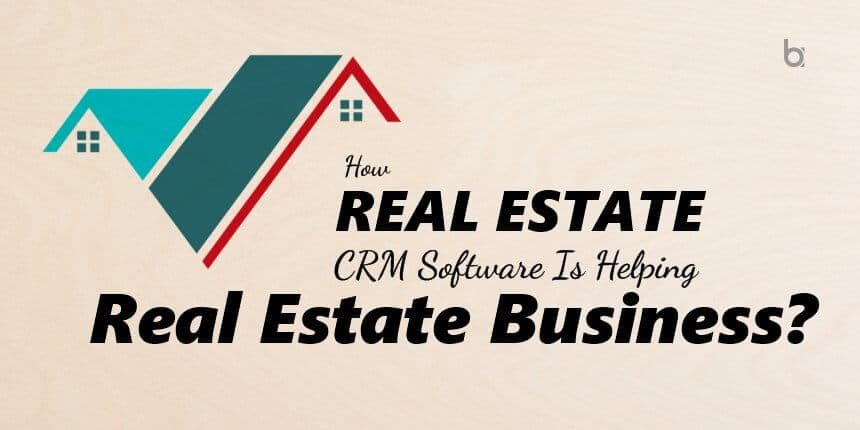Today, recognizing and fulfilling the demands of customers has become an industry lingo. As technology is evolving, customers are setting higher expectations than ever before for organizations to deliver the finest solutions. As a result, competition is increasing among organizations at a steady pace. The real estate industry is one of the most renowned sectors and is now emerging as one of the competitive industry. In the last couple of years, high growth has been witnessed by real estate professionals due to the rise in the demand for office space and urban and semi-urban accommodations. To stay ahead of their market competitors, they need to stay updated with the latest trends & technologies and adapt it to deliver the best possible service to their clients.
According to Gartner, revenues from CRM software surpassed database management systems to become the largest of all software markets at the end of 2018. Furthermore, the State of Inbound report shows that 13 percent of companies have opted to invest in CRM as a top sales priority for 2019. The statistics from Super Office reveal that CRM is expected to reach more than $80 billion in revenues by 2025.
The Need for Real Estate CRM
Having to interact with clients on a daily basis, real estate professionals need an ideal solution that can manage their tasks as well as store all the information related to clients. The real estate CRM is the solution that real estate professionals are looking for as it stores all information related to clients under one roof. Through this, real estate professionals can manage their business with minimal wasted time while enhancing the personalization of their communications. The software combines different categories such as sales, marketing, and customer support together, to streamline the processes, policies, and people all under a single platform. It also helps to track the conversation with the client, managing their database, follow-up with them regularly, etc.
Real estate CRM software allows real estate professionals to have robust and consistent communication with tenants, customers, suppliers, and stakeholders both externally and internally. efficiently. They can use the software for various operations including generating reports, maintaining RERA Compliance, executing the tasks, improving business processes and automated marketing, streamlining the payment process, etc. Also, information related to property, clients, transactions and communication processes can be found and retrieve easily from the system. As a result, real estate professionals are able to improve quality and revenue rates and achieve higher customer satisfaction scores while optimizing their asset productivity with the implementation of CRM solutions. The integration of real estate software for agents into their daily operations is a testament to the industry’s evolution towards more sophisticated and client-centric practices.
Features to be included in the CRM
Today, in the market, there is numerous software available for real estate professionals to choose from. But, the run-of-the-mill CRMs will not be enough. Customized CRM specific system ensures that the professionals can handle their tasks in a more efficient, professional and effective manner. Following are some of the features that need to be included in the CRM:
Lead/contact management system: This management system feature allows users to categorize people according to the referring party, competitors, leads and clients. They can further split this into hot/cold leads, level of satisfaction achieved i.e. high/low and old/current clients to better manage their sales and marketing campaigns.
List management: The CRM software equips with list management features that allows users to customize their data to build custom lists based on deals, dates, offers, events, and commissions.
Integration with other products: The CRM software should have seamlessly integrated with other products.
Mobile capability: Having access to CRM through mobile allows real estate professionals to view, check, and retrieve data easily. In this way, they are up-to-date with the latest information.
Email platform: Email has been regarded as a more professional way to communicate with each other. Therefore, having pre-designed email campaigns, built-in email templates can reduce the burden of real estate professionals and at the same time, increase the customer experience.
Ubiquitous Access to CRM
Mobile and other devices:
According to Nucleus Research report, companies using a mobile CRM, 65% are achieving their sales quotas. While only 22% of reps using non-mobile CRM have reached the same targets. Statistics from Forester have shown that 50% of teams improved their productivity by using mobile CRM. Companies offering mobile CRM access do not just increase the use of the software, but also the productivity of the workforce. Although the use of CRM on a mobile device is still lower than that from a laptop or desktop, the rising use from mobile devices and tablets means that 81% of users are now accessing their CRM software from multiple devices.
Increase in cloud-based CRM Solutions
The increasing need to access their software from multiple devices and locations has led to the upsurge of using cloud-based CRM solutions. In 2008, only 12% of businesses used cloud-based CRM which has now increased to 87%! SuperOffice has observed that cloud CRM usage grows from 15% in 2010 to 97% in 2019. Moreover, in 2019, spending on software as a service (SaaS) will reach approximately $42 billion and represent 75% of total customer relationship management (CRM) software spend, continuing the rapid decline of on-premises deployments.
Benefits of real estate CRM software
Today, many real estate professionals are attracted to CRM software because it provides various benefits as well as helps in managing their business transactions in a far more efficient manner. Following are some of the benefits offered by the software:
- Effective promotion and campaign management to various sets of prospects and clients.
- Keep a track of the profiles of their existing client base.
- Construct a variety of reports and dashboards that can make the decision-making process easier for management.
- Offer many strategic advantages such as the ability to personalize relationships with customers.
- One can cross-sell the related products based on the client’s data stored in the real estate CRM system
Presently, the market is crowded with numerous CRM software which make the task of choosing the best software quite difficult for real estate professionals. Therefore, HubSpot has compiled a list of top real estate CRM software for the professionals.
In final words
In the upcoming future, real estate CRM software is going to the most powerful tool that real estate professionals can use. The overall CRM usage increased from 56% to 74% has been recorded in the last year. Since real estate is a highly-competitive industry, it is going to be very difficult for professionals to survive. Therefore, by adopting the real estate CRM, they can have a competitive edge.





